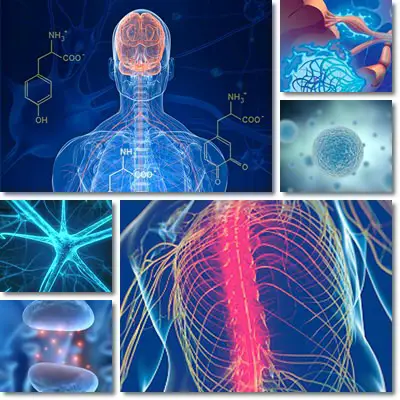Multiple sclerosis is currently one of the most widespread auto-immune diseases and a condition difficult to diagnose. It is a degenerative neurological disease, meaning it causes progressive nerve damage which affects multiple aspects of one’s health, hence the wide variety of signs and symptoms it engenders. Generally, motor skills, swallowing, speaking, breathing, vision, emotional health and cognitive abilities are all affected throughout the evolution of the disease. As nerve damage progresses, so does the loss of muscle control, resulting in walking difficulties, breathing, speaking or swallowing difficulty.
Different evolution patterns of the disease lead to different outcomes, some sufferers exhibiting a more rapid decline in their health than others. Although various factors have been theorized to contribute to the development of multiple sclerosis, the real causes for the condition remain unknown. Without knowing what aspect of health to address, no treatment for the condition currently exists. Symptoms management therapies and addressing the potential causes of multiple sclerosis represent the best course of action at present.

How do you know if you have multiple sclerosis? The disease may manifest differently in sufferers. Some may experience mainly muscle-related symptoms such as spasms or weakness, while others might exhibit eye-related symptoms such as double vision or dizziness. Despite the confusing variety of symptoms, eventually the disease will progress sufficiently and more characteristic signs of multiple sclerosis will debut. This means that it is important to pay attention to the evolution of certain symptoms such as an inexplicable fatigue originating in the muscles in order to benefit from an early diagnosis and make the most use of various therapies aiming at improving life with the disease.
MS signs and symptoms
Thus, the most and least common signs and symptoms of multiple sclerosis are:
1) Fatigue. Generalized fatigue, although nonspecific, is a common symptom of multiple sclerosis and is caused by the progressive loss of control over one’s muscles. Eventually, breathing muscles will be affected.
2) Sensory symptoms and muscle problems. Twitching, pins and needles sensation, tremors, tingling, numbness, muscle spasms and stiffness are common symptoms that may indicate the onset of multiple sclerosis. They are caused by the advancing nerve damage that alters normal sensory perception and leads to loss of muscle control.

3) Difficulty walking. Because the disease causes sufferers’ brain to slowly lose communication with their muscles, the resulting muscle weakness will most likely engender difficulty walking and standing and require sufferers to use walking aids such as crutches or a wheelchair. Symptoms are commonly present in the legs. However, multiple sclerosis also causes sufferers to lose use of their hands in addition to motor skills.
4) Vision problems. Because the optical nerves are part of the central nervous system, a high percentage of multiple sclerosis sufferers commonly report symptoms such as double vision, blurred vision, eye pain, involuntary eye vision, changes in the ability to perceive colors etc.
5) Dizziness and loss of balance. It is common for multiple sclerosis sufferers to experience dizziness and loss of balance, both symptoms being a direct result of the nerve damage.
6) Incontinence. Because of the loss of muscle control, multiple sclerosis can lead to bladder and bowel incontinence. Constipation is also known to occur because of the same reason. Fortunately, this aspect is manageable.
7) Pain. Multiple sclerosis is often characterized by experiencing pain in various areas of the body. This occurs as a result of the nerve damage. Pain may become chronic and difficult to manage.
8) Mood changes, depression. When the myelin sheath becomes damaged, the nerves’ ability to transmit chemical (but also electrical) impulses is gradually impaired. This translates into changes in the brain’s chemistry. These changes may contribute to the onset of depression and engender severe mood changes, especially irritability but also other forms of emotional instability.
9) Cognitive symptoms. Other symptoms consistent with multiple sclerosis include problems thinking, remembering things, focusing and learning. The sensory problems associated with the condition may also make it difficult for sufferers to correctly perceive their surroundings.
10) Speech and swallowing difficulties, breathing problems. These symptoms are all a result of the nerve damage that hinders the communication between the brain and specific muscle in the body.
11) Other symptoms. Headaches, itching, feeling an electrical type of shock running down the spine when bending the neck forward, a worsening of symptoms when temperatures are high, nausea may also indicate multiple sclerosis.
It is important to remember that symptoms never actually go away. In multiple sclerosis, sufferers experience either a progressive worsening of the condition, or episodes of relapse amidst periods of absence of symptoms. At what age is multiple sclerosis most likely to occur? Multiple sclerosis is often diagnosed from the ages of 20 to 50.
MS treatment options
Is there a treatment for multiple sclerosis? Currently there is no treatment for the condition. Various therapies have been proposed, but because the cause of the nerve damage has not yet been identified, they are not effective in stopping the progression of the disease. However, various medicines such as corticosteroids may be employed to help manage symptoms. Currently, symptom management is the preferred course of action in multiple sclerosis management.
MS management
Judging by the origin and nature of the symptoms and possible causes of multiple sclerosis, certain therapies may help reduce the severity of symptoms and improve the quality of life of sufferers. These may include any therapy that can make living with the condition better, but also more specific therapies aiming at improving particular symptoms.
1) Taking vitamin D. Because individuals living in cooler climates with less sunshine (further from the equator) have higher risks of multiple sclerosis, vitamin D supplementation may help with the condition. The nutrient has deep positive implications for the immune function and may help reduce damage, slow down the progression of symptoms and even lower risks of the disease if, of course, a deficiency contributes to the onset of the disease in the first place. Moreover, research shows that taking vitamin D supplements during winter in areas with little sunshine can efficiently combat seasonal affective disorder and help improve mood and prevent depression.
2) Magnesium and potassium supplementation. Magnesium supplementation can help stop, reduce or control twitching, needles and pins sensations and other similar muscle occurrences. It can also contribute to emotional health by improving mood and lowering the risk of or even treating mild depression episodes caused by dealing with the condition. Taking magnesium supplements can also help in dealing with anxiety brought on by the diagnosis.
Potassium is an electrolyte which balances fluids in the body and contributes to ensuring the conduction of electrical impulses in the body, potentially improving some aspects of the disease such as loss of muscle control. The adequate magnesium and potassium dosages are best prescribed by a medical professional who is up to date with your condition and its evolution.
3) Reducing inflammation. This can be achieved by clean eating: avoiding foods that create inflammation and eating foods that reduce it. Cherries, ginger and fish rich in Omega-3 fatty acids are some of the most potent anti-inflammatory foods we can introduce in our diet. Krill oil and salmon are two great sources of Omega-3, a nutrient which specifically targets brain health. Vitamin C is also an excellent natural anti-inflammatory.
Various medicines such as prednisone can help manage inflammation pain, but this aspect is best handled by a medical professional. Consumption of antioxidant-rich herbal teas may prove useful as well. Smoking and alcohol consumption can lead to excess inflammation in the body, while stress can trigger episodes that lead to the worsening of the condition.
4) Coenzyme Q10. It is a vitamin-like nutrient shown to support muscle health. It is possible it may have a beneficial action and improve the quality of life of sufferers.
5) Pain management therapies. One of the symptoms of multiple sclerosis is chronic pain. In view of a better quality of life, anti-inflammatory medication prescribed in doses carefully monitored by a medical professional can help manage inflammation and pain. Infrared light therapy can help improve muscle symptoms such as pain, stiffness, spasms etc. See the benefits of getting an infrared lamp. Physiotherapy, massage, chiropractic treatment, acupuncture may also hold certain benefits and improve sufferers’ quality of life.
Conclusion
Nerve damage occurring in multiple sclerosis slowly cuts off communication between our nervous system and the rest of the body. The more damaged the nerves, the more information is lost on its way to and from the brain, resulting in specific symptoms generally indicative of loss of muscle control. Because there is currently no effective treatment for multiple sclerosis, the only solution for sufferers is to work towards managing their symptoms to reduce the severity of the impact of the disease and enjoy an improved quality of life.
